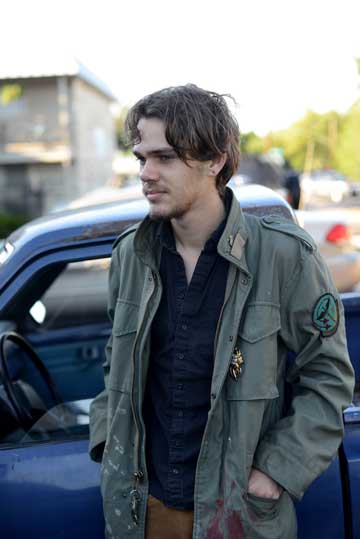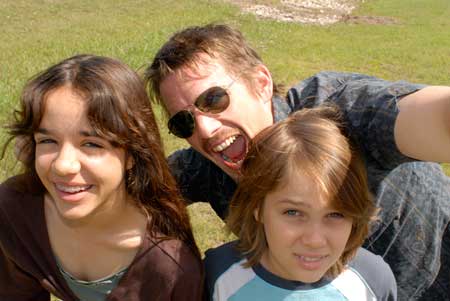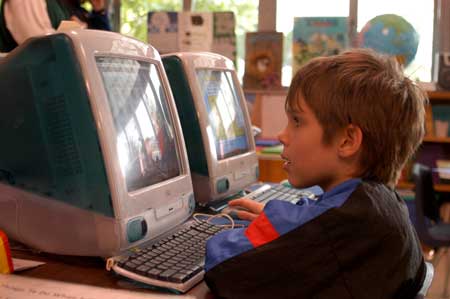Film (2014)
Written and directed by Richard Linklater
Cinematography by Lee Daniel, Shane F. Kelly
Film Editing by Sandra Adair
Kendall Square Cinema, Cambridge, MA
With Ellar Coltrane (Mason), Patricia Arquette (Mom), Ethan Hawke (Dad), Lorelei Linklater (Samantha)

in “Boyhood”
Photo: Courtesy of Matt Lankes
An IFC Films Release
Richard Linklater is some kind of genius, hard to tell exactly what kind, but one with a unique method and vision.
The series of films with Ethan Hawke and Julie Delpy (Before Sunrise (1995), Before Sunset (2004), Before Midnight (2013)) has demonstrated his commitment to long-range vision of a very particular sort. In that sequence of films shot over a period of eighteen years, Hawke and Delpy play the same characters evolving through time. It’s an amazing exercise, and the only frustration is getting caught up in it and knowing that the next chapter is not likely to appear for another nine years.
Boyhood is a related kind of enterprise, but, in this case, though shot over the span of twelve years, is edited together into a single, very long film (it runs almost three hours).
The same central actors play their roles throughout. Patricia Arquette is the mother, Ethan Hawke (one of the thespian anchors of the Linklater universe) plays the father, Lorelei Linklater (Richard Linklater’s daughter) plays Samantha, the daughter, and Ellar Coltrane plays Mason, the son.

Ethan Hawke as Dad
Ellar Coltrane as Mason at 9
in “Boyhood”
Photo: Courtesy of Matt Lankes
An IFC Films Release.
What is really stunning is that the two kids – Lorelei Linklater as Samantha and Ellar Coltrane as Mason – start out as really young children and we watch them literally mature into young adulthood over the course of the film. The effect, in a narrative film, is so different from anything we usually see that the effect is striking and overwhelming. Though Arquette and Hawke change over the actual years, it’s not all that much; they age believably, but are not so terribly different at the end than at the beginning. The kids, however, do, and the moment one realizes what the film is accomplishing is a penetrating one.
Some documentary films, like the recent 56 Up (2012) by Michael Apted and Paul Almond, have done longitudinal treatments (the Up series surveys its subjects every seven years) and we get to see the same characters evolve over a period of decades.
There are very few narrative filmmakers, however, who have tried what Linklater has. The great French director Francois Truffaut did something similar with the character Antoine Doinel, played by Jean-Pierre Léaud, in five films ranging over two decades, from The 400 Blows (1959) to Love On The Run (1979). The Apu Trilogy (1955 – 1959) by the great Indian director Satyajit Ray also represented a coming of age story done over a period of years. Such cases, however, are few and far between.
Apart from his unique and bold vision about how to architect a film, Linklater is just a brilliant director. I don’t know how much of the script is improvised, but much of it comes off as so natural that it does not seem scripted. This, too, is the case with the Hawke-Delpy films, but I gather that most of them are scripted to the word. Notably, however, Linklater includes his cast in the authorial process, and each installment of Boyhood involved collective scriptwriting at the time of shooting. The same was apparently true of the Hawke-Delpy films.
Coltrane’s performance as the boy is particularly noteworthy. It is quite something to watch this performance over the series of years. He is so convincing and has such a potent screen presence one can barely believe he’s just a little kid when he starts out. And his presence grows more penetrating as the years wear on. Somehow, with Linklater’s help, he really does brings one inside the heart of a kid who’s been batted around from home to home and place to place and had to find a resilient core within himself. Coltrane does an extremely convincing job of this, holding the core of the film with his youthful but compelling gravitas.
Lorelei Linklater is, particularly as a very young girl, an incredibly entertaining screen presence, and, as she matures, gains a kind of earthy animated charm which complements Mason’s cool silence.
Hawke contributes a rowdy effervescence to the mix as the somewhat errant, but still devoted, father whose offbeat and sometimes sketchy ways gradually come across as beautifully effective parenting.
And Arquette also gives a performance which is vulnerable, forceful, and which exhibits the appropriate breakages of judgment that make the story interesting.
That all of these actors can keep their characters coherent and alive over the course of this incredible epic filming journey is almost unbelievable.
Naturally, it is Linklater’s capable steering of the project that enables these actors to so convincingly create unified characters over time.
The overall effect is mesmerizing. One is not watching a staged family history, but one observed. A bit like a performance piece in extenso and a bit like a dramatic marathon, it accomplishes a different esthetic goal than a staged history could.

in “Boyhood”
Photo: Courtesy of Matt Lankes
An IFC Films Release.
One watches the development of the young Mason and thinks this must be a temporally transposed analogue to Linklater’s own development. How else could he have generated the energy and passion to keep such a great experiment going over that period of time?
– BADMan
Leave a Reply